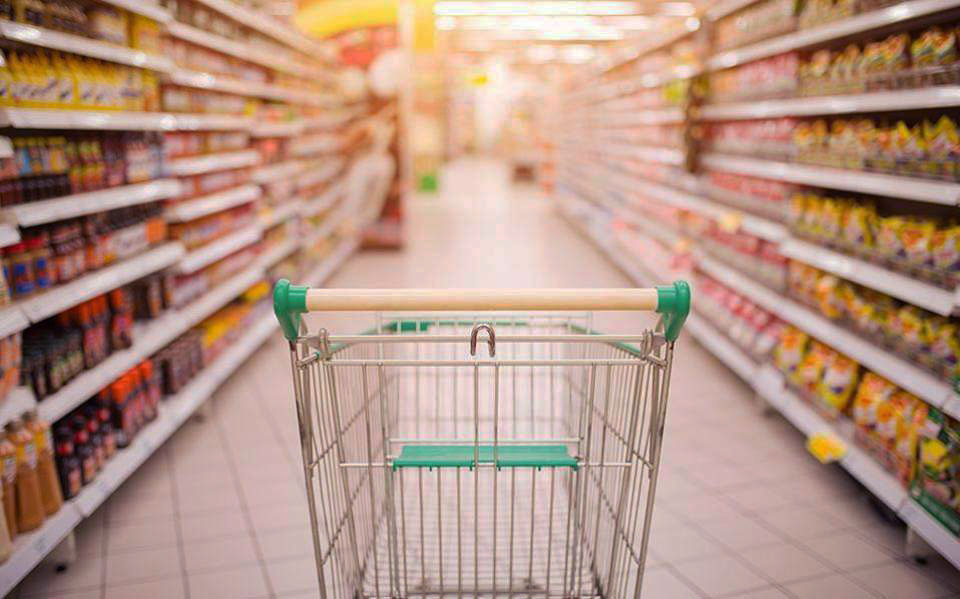
With the price rally in food items continuing despite falling inflation, the domestic food and beverage industry is facing multiple challenges in order to maintain but above all enhance its momentum, both within the country and abroad.
Consumers who have suffered a reduction in their income and the guarantee of food sufficiency remain a key priority for the Greek food and beverage industry, the president of the Association of Greek Food Industries-SEBT, Mr. Ioannis Yotis, pointed out during yesterday’s annual General Meeting of the members of the Association.
SEBT’s commitment to the development of more sustainable food systems
However, he pointed out “unfortunately, however, geopolitical turmoil has consolidated, while inflationary pressures continue to leave their mark. The negative effects of crises are not easy to reverse immediately.”
At the same time, pointing out that “businesses in the sector are facing sustainability issues similar to last year, such as the increased costs of energy and raw materials, the reduced purchasing power of consumers and delays in the absorption of financial tools” he emphasized that “we want the state to help and not be against us”.
Private label on full “offensive”
Despite large price increases recorded by private label products, their share is growing impressively, posing yet another strong challenge to the domestic food industry.
Based on the data presented by Mr. Panagiotis Boretos, managing director of Circana (former IRI), in the period January – April 2023 the total share of private labels reached 19.3%, when the corresponding quarter of 2022 was 16%.
There is a big increase in private label dairy products, as from 13.4% last year they show a share this year to 15.8%, in frozen foods from 21% they go to 22.3%, in non-alcoholic beverages from 5.8% they go to 6.7%.
In all packaged codes, private labels show a market share of 21.7% from 20.2% last year.
It is worth noting that the growth rate of private label products is higher compared to the entire food category, with turnover in consumer staples in the four months January – April 2023 rising 9.3%, while in food the growth is 8.2 % in value but volumes are down 0.9% when the average appreciation stands at 9.2%.
On the contrary, the prices of private label products recorded a high increase of 13%, indicative of the dairy price increases which exceeded 15.7%. Despite this, there is a significant boost in volume sales, as the price gap in relation to branded brands remains large.
It is characteristic that based on Circana’s measurements, the top 60 product categories in the first five months of 2023 will increase by 10.5% in value, with branded products registering growth of 8.6% and private label by 20%.
In terms of volume, branded products are down (–0.7%), while private label sales are up around 5%.
Branded products increase their prices by 9.3% when PLs show a price increase of 14.4%.
The basket of 60 branded products cost 190 euros last year, while this year the same basket costs 207 euros.
Accordingly, the same basket with private label from 131 euros last year costs 139 euros this year, with the “scissors” in prices remaining large.
An important factor for the “invasion” of private label products was the “household basket” and as noted by Mr. Boretos, “the branded products that did not have a price reduction and entered the household basket had almost no growth.”
The causes of inflation and the threat to competitiveness
“The two causes of triggering inflation: monetary policy in the period of the covid crisis and the energy crisis, have launched an autonomous course for prices, creating a spiral with wages as well”, pointed out Mr. Nikos Vettas, General Director of The Foundation for Economic & Industrial Research (IOBE) & Professor at Athens Economics University.
According to Mr. Vettas, “if in the next three to four years the rate of inflation domestically is not lower than the rate of inflation in other European countries, we will lose competitiveness. The sector’s exports have been on the rise in recent years, but the level is still lower than the corresponding products exported by other countries. It is difficult to maintain high export rates when the macroeconomics of the target markets, to which you are targeting your exports, are limited.”
In fact, Mr. Vettas, commenting on the idea that inflation is a good thing because it inflates private and public debts and brings unexpected profits to the public through price increases and indirect taxes, said that “temporarily it certainly “buys” you time, but in the long run it will it is wrong for economic policy to support inflationary policies because a large part of the households that will not be able to afford it”.
Latest News

German Ambassador to Greece Talks Ukraine, Rise of Far Right & Tariffs at Delphi Economic Forum X
Commenting on the political developments in his country, the German Ambassador stressed that it was clear the rapid formation of a new government was imperative, as the expectations across Europe showed.

Athens to Return Confiscated License Plates Ahead of Easter Holiday
Cases involving court orders will also be excluded from this measure.

Servicers: How More Properties Could Enter the Greek Market
Buying or renting a home is out of reach for many in Greece. Servicers propose faster processes and incentives to boost property supply and ease the housing crisis.

Greek Easter 2025: Price Hikes on Lamb, Eggs & Sweets
According to the Greek Consumers’ Institute, hosting an Easter dinner for eight now costs approximately €361.95 — an increase of €11 compared to 2024.

FM Gerapetritis Calls for Unified EU Response to Global Crises at EU Council
"Europe is navigating through unprecedented crises — wars, humanitarian disasters, climate emergencies," he stated.

Holy Week Store Hours in Greece
Retail stores across Greece are now operating on extended holiday hours for Holy Week, following their Sunday opening on April 13. The move aims to accommodate consumers ahead of Easter, but merchants remain cautious amid sluggish market activity.

Green Getaway Ideas for Easter 2025 in Greece
Celebrate Easter 2025 in Greece the sustainable way with eco-farms, car-free islands, and family-friendly getaways rooted in nature and tradition.

Civil Protection Minister Details Summer Firefighting Plans at Delphi Forum
At the 10th Delphi Economic Forum, Minister of Climate Crisis and Civil Protection Yiannis Kefalogiannis discussed Greece's plans for the upcoming fire season.

How Shops and Markets Will Operate During Easter Holy Week
The Easter holiday schedule has been in effect since April 10, with retail stores open Palm Sunday, and most supermarkets also operating to meet consumer demand for Easter shopping

Why Is the French Aircraft Carrier Charles De Gaulle in Piraeus?
Docking in Piraeus after a four-month deployment in the Indo-Pacific region, the admiral of the aircraft carrier the Charles de Gaulle says, "Greece is our best partner in the Mediterranean."





























![F-35: Το ακριβό μαχητικό που διεκδικούν αρκετές χώρες [γράφημα]](https://www.ot.gr/wp-content/uploads/2025/03/f-35-1-600x400.jpg)










 Αριθμός Πιστοποίησης
Αριθμός Πιστοποίησης